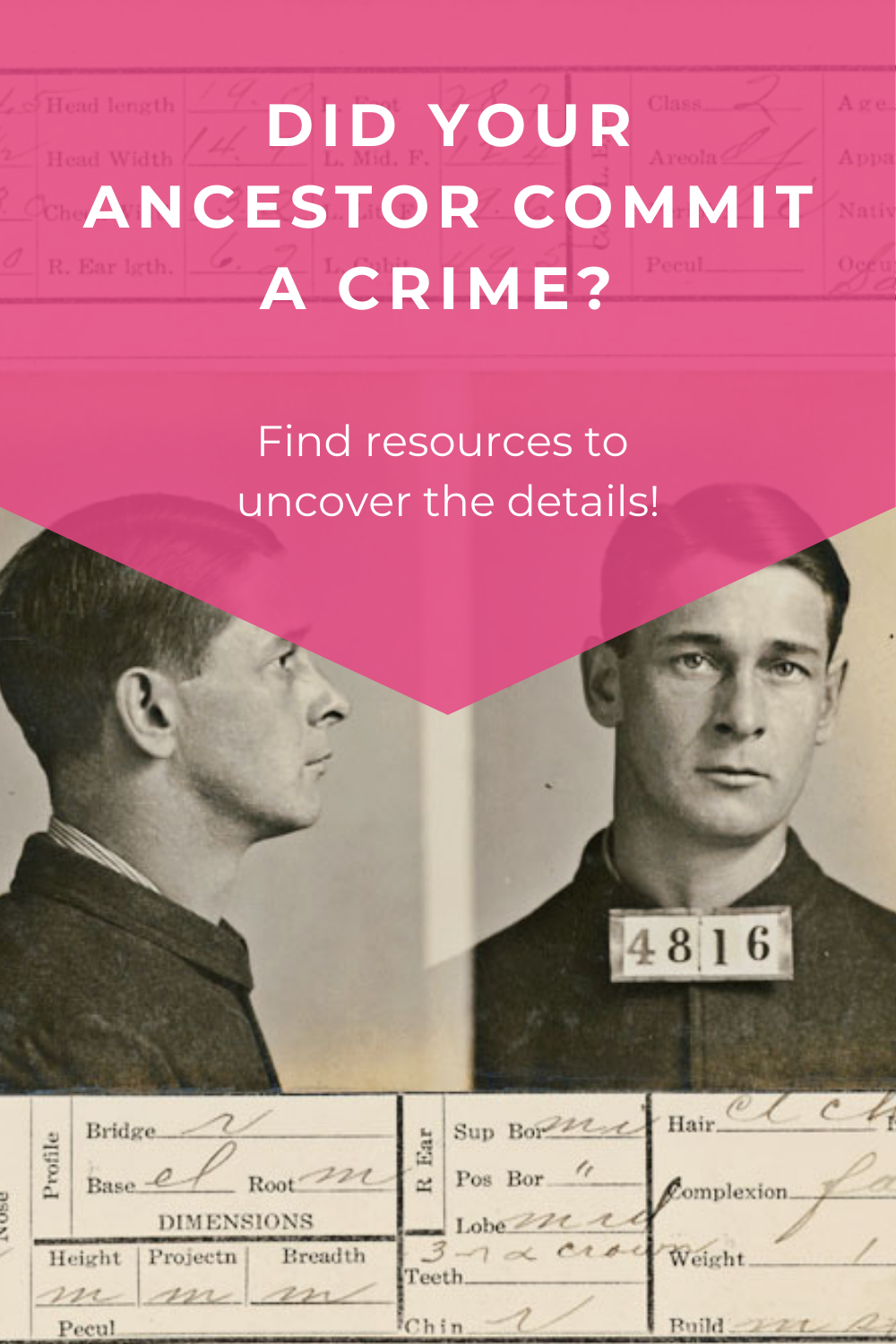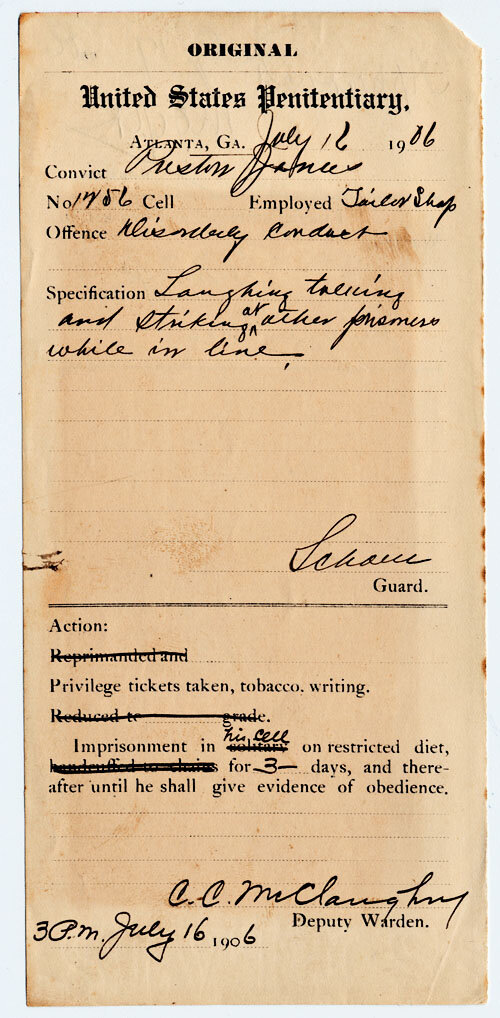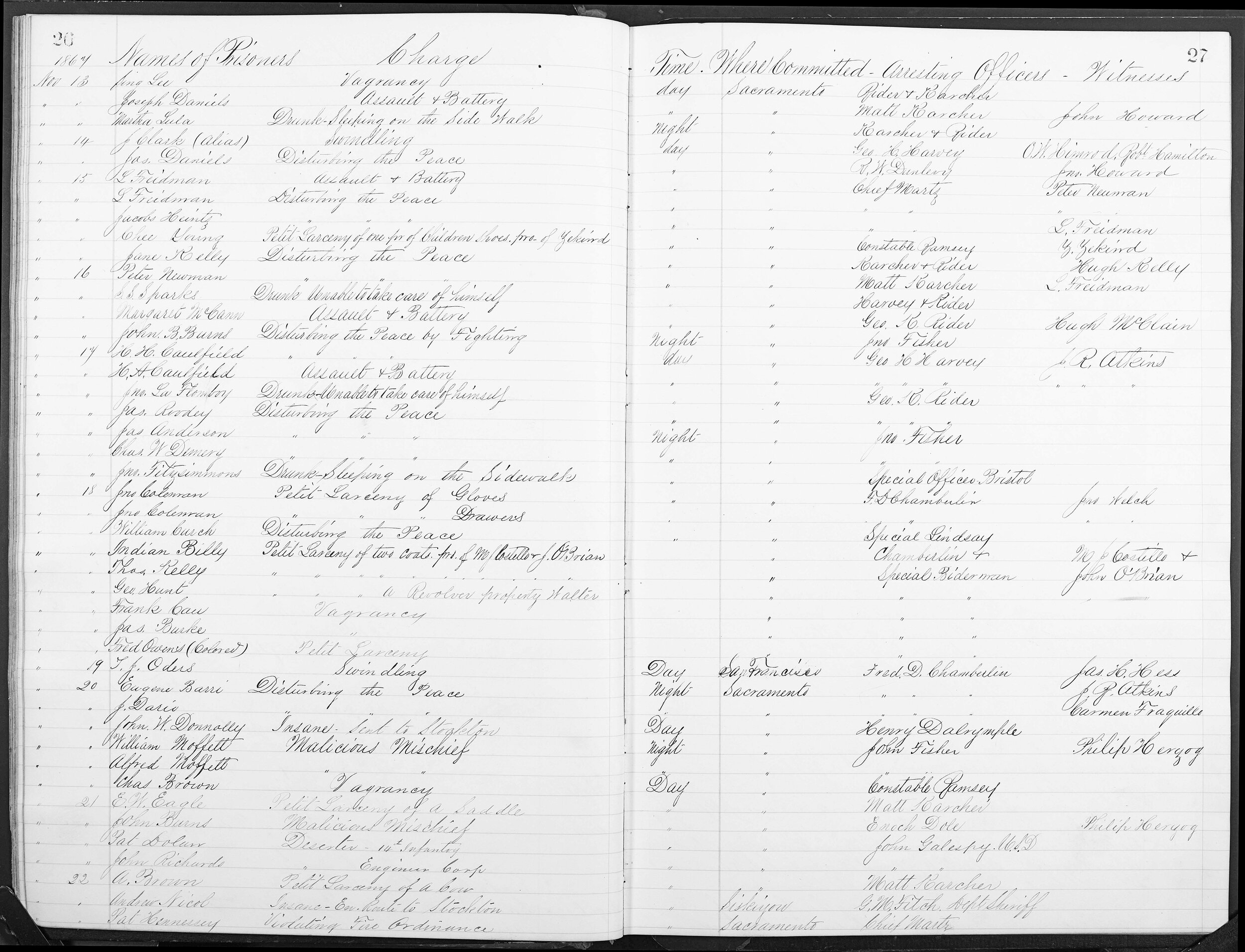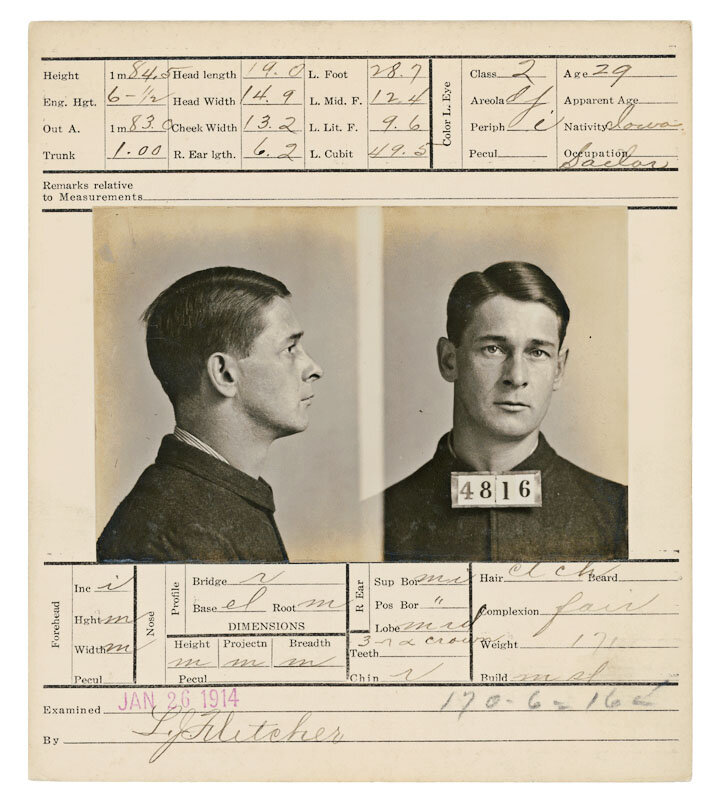Tracing the Troublemakers: How To Research Your Criminal Ancestors
*This post may have affiliate links, which means I may receive commissions if you choose to purchase through links I provide (at no extra cost to you). All opinions remain my own.
Once upon a time, I was looking into the siblings of my 3x great-grandmother, hoping to find information about where their parents were from. Their parents’ birthplaces and other background information were a mystery at the time.
During my research, I stumbled upon one of her brothers, Horace, in the Northampton, Massachusetts County Jail in the 1880 census!
It caught me by surprise but then I grew excited at the paths this discovery could take me down.
While it can be shocking to discover a lawbreaking ancestor, they can turn into great stories if you dig deeper.
If you’ve found a jailbird in your family tree, you may wonder what to do next. In this blog post, I’ll dig into how to research your criminal ancestors, how to find old prison records, and the types of records there are to delve into.
Types of correctional institutions
First, let’s do a quick break down the basic types of correctional institutions that your felonious forebear may have found themselves in.
Jails are local facilities that hold people for a short time before trial or for minor crimes. They’re run by cities or counties.
State prisons are for people who commit state-level offenses, such as murder or robbery.
Federal prisons house inmates convicted of crimes like tax fraud. The federal prison system started in 1891 with the Three Prisons Act. This created federal prisons at Leavenworth (KS), Atlanta, and McNeil Island (WA). In the 1920s, women’s prisons began to spring up.
Related posts:
How the Digital Public Library of America Can Power Up Your Genealogy Research
Why Archive Research is a Game-Changer For Your Genealogy Journey
6 Ways the Library of Congress Online Collections Can Help Your Genealogy
Why Isn’t My Ancestor in the Census?
Mixed feelings that may come up
Some people may feel embarrassment, guilt, or shame after discovering that they have a supposed criminal in their family tree.
Others may feel excitement or pride. Or a mix of everything. It’s all valid.
But it’s important to note that in the past, people may have received punishment for actions that we think of as minor now. Issues like swearing, cheating on their spouse, or racking up debt may be morally debatable but aren’t thought to be criminal offenses like the past.
The ages of people caught up in the criminal justice system also weren’t always considered. Before youth institutions began in the mid-1800s, children went to prison with adults or were even executed for crimes as small as stealing bread.
That’s why it’s essential to explore more of the back story to see what your ancestor was accused of and the laws at the time that led to their arrest or conviction.
Now, let’s get into the records you can use in your search.
Related posts:
How To Evaluate Sources For Confidence In Your Genealogy Research
11 Smart Strategies For Searching For Ancestors Who Changed Their Name
6 Google Search Tips For Genealogy That Will Save You Hours Of Time
Common Genealogy Mistakes And How To Avoid Them
Genealogy resources about incarcerated people
There are many types of records to help your family history research into ancestors accused of a crime.
Census records
Prisoners got enumerated like everybody else. Look for your relative listed as an inmate in a correctional facility.
The institution’s name will generally be at the top of the page and their relationship will be something like prisoner or inmate.
The 1880 Dependent, Defective, and Delinquent Schedule gives more details about inmates, like the incarceration date and the alleged offense.
Historical prison records
Prison and jail records can tell you what crime the person committed and their sentence. A search for prison records can also share marital status, a physical description, and where they were from. Some old prison records may say whether they had been in prison before.
While many of these files still exist, there is no central place where they’re kept. Many are in archives and other institutions, but luckily, some are now online.
Not Frisco has a list of Alcatraz inmates and their crimes.
Ancestry has many convict records, like Alabama convicts and Texas convict registers. They also have records for other countries.
FamilySearch also has US and international prison record collections. One interesting set is for prison births at the Philadelphia County Prison.
There’s also a prison register for San Quentin, and records from the Yuma, Arizona territorial prison, among others.
Police and arrest reports
Old arrest records and other police files can be harder to find but are worth looking for because of the wealth of information they can include.
They may give the date and time the crime occurred, the charge, where it took place, who arrested the person, and any witnesses. Mug shots, birth dates, and where they lived might also be inside.
I Dream of Genealogy has links to records for a handful of states.
FamilySearch has arrest records for Sacramento, California.
Court records
Court records can be very beneficial for learning more about criminal case files. They can have witness testimonies, correspondence, and details about the person and the alleged crime.
Most court records are still only found at the county courthouse, but some indexes and records are online. The Oshkosh, Wisconsin court records index or the criminal court records for Hawkins County, Tennessee are two examples.
Related posts:
Analyzing Evidence: 10 Benefits Of Evaluating Your Genealogy Research
12 Rich Resources to Help You Research Poor Ancestors
4 Fun And Easy Ways To Use Flickr For Genealogy
How To Reveal Your Ancestors' Stories With The Scoop From Society Pages
Execution records
Looking up execution records may seem morbid. But they can provide a lot of information, like the date of death, the crime committed, age, and occupation of the executed. And they might be the only record left of what happened to your ancestor.
DeathPenaltyUSA has lists by state of people executed from 1607 to 1976, with some basic information about them and their crime.
West Virginia Archives & History has a list of executed prisoners in the West Virginia Penitentiary.
Alabama Department of Corrections shows executions since 1927.
The National Parks Service has a list of men executed at Fort Smith from 1873 to 1896.
Newspapers
Newspaper articles are great resources for learning about old criminal cases. While historical newspapers may be in a sensational, exaggerated style, they can still give insight into what happened.
Some great newspaper sites to try are:
- Chronicling America, which has newspapers from 1789-1963.
- GenealogyBank has newspapers from 1690 to today. 95% of the 13,000 papers there are exclusive to them.
- The Ancestor Hunt has a huge list of newspapers, organized by state.
Archives and societies
Local, state, and national archives may have historical criminal records to benefit your search, like old jail records. Some may have only indexes online and you’ll have to request copies of the original documents or visit in person.
If going in person, be sure to use a repository visit checklist to ensure you’re prepared for your trip.
The Idaho State Historical Society has an Old Idaho Penitentiary Inmates Catalog. This has aliases, photos, correspondence, sentencing information, and more.
The Oklahoma Historical Society has photographs and fingerprint cards in its prison archives collections.
The Washington State Archives has a Walla Walla Penitentiary database with records of prisoners from 1887 to 1922. The files may have the parents' birthplaces, military service, marital status, photographs, physical description, names of relatives, and court records.
The National Archives also has many collections of federal prison records.
Record Group 129: Records of the Bureau of Prisons, 1870 – 2009 is the main collection. It also has a bunch of sub-collections helpful to people looking for genealogical information.
Just a few of those sub-collections are:
Inmate case files for Atlanta prisoners from 1902-1922
Records Regarding Federal Penitentiary Inmates Inducted Into the U.S. Army, 1943 – 1945
Records of Penitentiary Sentences from 1897 – 1907
The Island Lantern, a journal by the prisoners at McNeil Island Penitentiary.
There are also series for inmate photos, parole books, criminal history sheets, and more. They also have research guides and name indexes for a few federal prisons.
Be sure to also check town and county historical societies, as they could have old inmate records from the local jails.
Other resources for criminal history records
Black Sheep Ancestors has links to outlaw and criminal ancestor searches, court records, and executions in the US. There are also some UK and Canadian resources.
The Criminal Ancestors Facebook group helps people find criminal records for genealogy.
Ancestry has some FBI criminal files.
Patterson Smith made a database of info from true crime detective magazines with victims, perpetrators, crime location, and year.
Related posts:
How To Research Your Orphan Ancestors
How To Use The Online Archive Of California For Genealogy
Why You Should Use Libraries In Archives For Your Family Tree Research
Final thoughts
Researching the stories of your ancestors who encountered the justice system can provide a richer picture of your family history.
When researching criminal ancestors, it's crucial to approach their stories with an open mind. Understanding the historical context of their actions and the laws at the time can shed light on the circumstances and help you piece together what happened.
Whether you uncover census records, prison documents, court records, or newspaper articles, each piece of information will add depth to your family narrative.
Through these resources, you can learn more about your ancestors' physical descriptions, family relationships, and other genealogical details.
Have you uncovered any jailbirds in your family tree? What records have you found to learn more about their stories? Share in the comments below!




